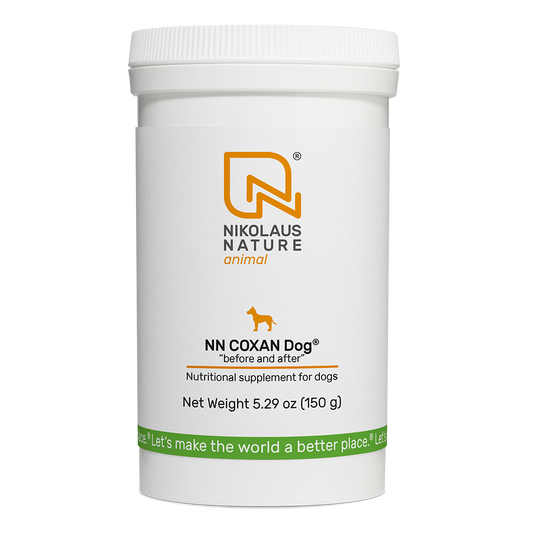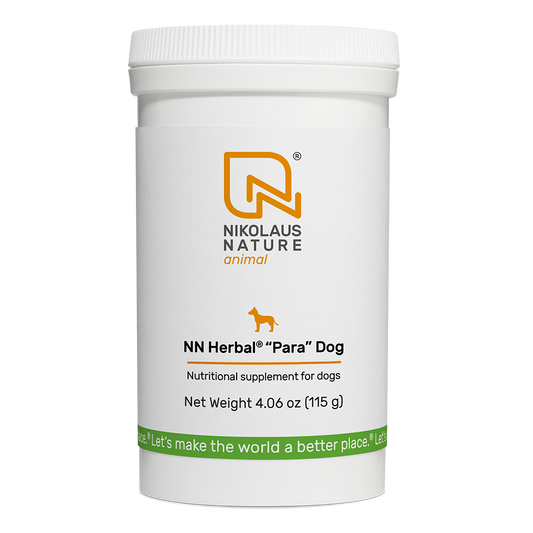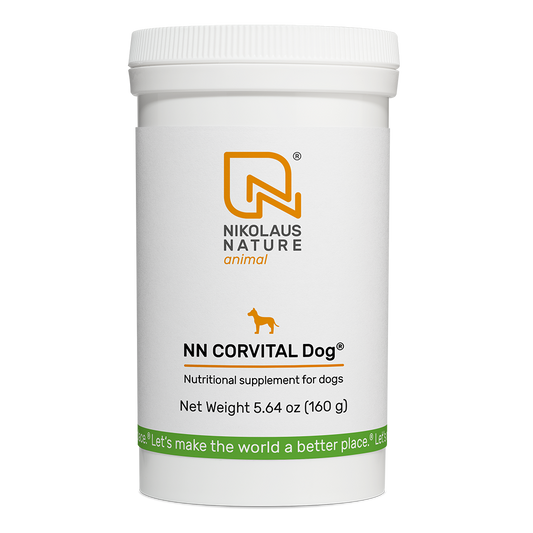How to Naturally Prevent Canine Liver Disease?
While liver disease may not be completely avoidable or preventable, there are steps that can be taken to reduce a patient’s risk in some cases. The liver is responsible for storing nutrients, secreting bile to aid in digestion, and detoxifying the blood by breaking down toxins to produce waste products. More specifically, phase 1 of detoxification makes toxic compounds water soluble, then phase 2 of detoxification makes them even more water soluble for easier elimination through bile and urine.

Just as the heart and lungs are essential to function daily, so is the liver! The liver has a hard job, and certain substances and medical conditions can make it have to work even harder. When the liver is overworked, this can lead to liver damage which may or may not be reversible. Taking precautions to protect the liver can help maintain liver health for as long as possible and reduce the risk of developing liver disease.
What is Canine Liver Disease?
Liver disease is a term encompassing many different forms and causes of liver dysfunction. When liver disease occurs, toxins and waste build up in the blood stream leading to symptoms such as lethargy, vomiting, poor appetite, diarrhea and jaundice (yellowing of the skin), and in severe cases even seizures. Fortunately, the liver has a large functional reserve and is capable of regeneration after tissue injury.
Causes of Liver Disease in Dogs
Liver disease typically falls into one of two categories: acute or chronic. As the name implies, acute liver disease comes on quickly and requires urgent veterinary attention. Chronic liver disease is gradually progressive and may or may not cause symptoms until later stages. Liver disease may be acute at first and then become chronic in the face of severe injury. Some liver diseases can be congenital as well.
Some causes of liver disease can include:
-
Infectious Hepatitis: Infectious hepatitis involves infection of the liver with bacteria, viruses, fungi or parasites. Common and notable causes of infectious hepatitis include:
- Leptospirosis- Leptospirosis is a bacterial infection spread through infected animal’s urine, including other dogs as well as wildlife like raccoons or deer. Leptospirosis is zoonotic, so once diagnosed, owners must take caution to avoid direct contact with their pet’s urine. It can cause very severe liver disease, but if caught in time can be cured with antibiotics.
- Histoplasmosis- This fungal disease can infect many organs. When it infects the liver, owners will notice anorexia, vomiting, lethargy and sometimes jaundice. Histoplasmosis is picked up via ingestion or inhalation of fungal spores often transmitted in bird or bat feces. This disease can be treated with antifungals.
- Adenovirus- Canine adenovirus 1 can affect many organs, but especially the liver resulting in liver necrosis. While some pets can survive with supportive care, there is often irreversible damage. In this case, an initially acute hepatitis can turn into a chronic form.
- Toxoplasmosis- Toxoplasmosis is caused by a protozoon that can damage liver cells leading to sudden liver failure, but not all dogs exposed to toxoplasmosis will develop liver failure or even symptoms. It is typically picked up by ingesting the tissue or feces of an infected animal. It can be zoonotic, especially to immunocompromised human and can cause birth defects.
- Medication Induced: Certain classes of drugs are more heavily metabolized by the liver and when used chronically can cause damage to cells. Examples include steroidal and non-steroidal anti-inflammatories, some anti-fungals and certain anti-seizure medications. When these medications are given on a chronic basis, liver function should be monitored via bloodwork at regular intervals. If medication-induced liver damage is suspected, the inciting medication must be discontinued immediately.
- Toxin Ingestion: Just as certain medications cause the liver to work harder and can cause damage, certain toxins can do the same. A well-known example is blue-green algae. When ingested, often around shallow, stagnant water, the toxins within called cyanotoxins accumulate in the liver causing extreme damage. The liver can fail quickly after exposure and can require intense hospitalization for survival. Other toxins that can cause liver failure include aflatoxins produced by a fungus called Aspergillus, some species of mushrooms and chocolate.
- Copper Hepatopathy: Copper hepatopathy (CH) happens when there is an abnormal accumulation of copper within the liver’s cells. Any breed can be affected by CH, but Bedlington Terriers and Labrador Retrievers are predisposed due to gene mutations. Patients without a mutation can still develop CH if fed a diet containing excessive amounts of copper. CH is a form of chronic hepatitis, but fortunately if caught and diagnosed via biopsy it can be managed via changes to diet and supplements to reduce copper storage.
- Endocrine Disease: Endocrine disorders can lead to more work for the liver as well, including diabetes, Cushing’s disease or hyperthyroidism. Uncontrolled diabetes can cause an excessive mobilization of fat which can clog up the liver. Cushing’s disease leads to an excessive amount of cortisol, a steroid hormone, in the blood therefore causing injury similar to overuse of steroidal medications.
- Cancer: There are multiple types of cancer that can originate from or spread to the liver, namely carcinomas and hemangiosarcomas. When too much of the liver is overtaken by a mass, there may not be enough functional cells to keep up the with body’s demands for detoxification, leading to liver dysfunction.
- Portosystemic Shunt: A portosystemic shunt (PSS) is when an extra blood vessel is present causing blood from the digestive tract to bypass the liver and go straight into systemic circulation rather than going through the liver and being detoxified first. These extra toxins in the blood can lead to a neurologic issue called hepatic encephalopathy which often manifests as seizures. PSS is often congenital but can be acquired. The lack of exposure to normal workload by the liver leads to atrophy and liver failure. This can be reversible if managed in time. Surgical correction of the shunt is the gold standard of treatment, but medical management can be used until surgery is scheduled and involves a low protein diet and administration of medications to minimize production of toxins in the blood.
- Idiopathic: Sometimes a diagnosis of liver disease is made via ultrasound and bloodwork with or without a liver biopsy, but an inciting cause is not able to be determined. Those cases would fall into the category of idiopathic liver disease.

Nutrition and How It Affects the Liver
Depending on the underlying cause of liver disease and the presenting symptoms, the nutritional recommendations for dogs may vary. While protein restriction is recommended for some, it is not one size fits all as this may be detrimental to others. Protein is broken down into ammonia which in a healthy patient is further broken down into urea and excreted out. In patients with liver dysfunction, a condition called hepatic encephalopathy can occur due to excessive ammonia in the blood. Patients experience symptoms such as drooling, weakness, sudden blindness, head pressing and seizures. These patients should be protein restricted to a degree that controls their symptoms.
In patients who have not been diagnosed with hepatic encephalopathy, that degree of protein restriction can cause issues. Rather than the focus being low protein, it should be an appropriate level of high-quality protein (more on this below).
10 Ways to Prevent or Manage Liver Failure in Your Pup Naturally
While some causes of liver disease do require specific medications to treat, there are a plethora of natural supplements and remedies which can promote liver health. These can be used to lower a pet’s risk of liver disease and can be used in conjunction with targeted and symptomatic medications to treat ongoing liver disease. A therapeutic approach should aim to be anti-inflammatory, provide antioxidants, and reduce the liver’s workload.
High-Quality Protein Intake
Protein is essential to liver function and to the liver’s creation of several important proteins such as albumin and antithrombin. Diet is a very important part of managing liver disease. The liver metabolizes protein and creates waste products such as ammonia and urea. These waste products can build up and cause neurologic issues. The best thing owners can do for diet is to give an adequate amount of high quality, easily digestible protein so that the liver has the protein it needs in the most usable form and in moderation.
Feeding Animal Liver
Liver can be a great source of B vitamins and proteins. Patients with liver disease can benefit from this simple source of nutrients. When liver is offered, it should always be cooked to ensure any bacteria or parasites present will not be transmitted to the pet.
Dandelion Root
Dandelion root exhibits anti-inflammatory and antioxidant effects which reduce the hepatotoxicity of certain toxins. More specifically, it helps promote detoxification of the liver and gall bladder and can therefore aid in maintaining liver function and slowing the progression of liver inflammation and damage.
Milk thistle
Milk thistle, scientifically known as Silybum marianum, has shown hepatoprotective effects, providing a more natural option for patients with liver damage. The active compound, silymarin, is thought to reduce damaging free radicals and exhibit anti-inflammatory effects. There have been a few studies that show hepatoprotective effects of milk thistle in dogs exposed to otherwise hepatotoxic mushrooms.
Sulforaphane
Sulforaphane is a potent activator of one of the major metabolic pathways in the liver. This antioxidant can be found in cruciferous vegetables such as broccoli or brussels sprouts and has also been studied for having some anti-cancer effects.
Curcumin
Curcumin, derived from turmeric, upregulates important enzymes within the liver promoting its ability for metabolization of other substances. It improves digestion, decreases intestinal inflammation and promotes cardiovascular health as well.
B vitamins
Vitamin B6 enhances natural production of glutathione and also plays an important role in detoxification as it is part of certain chemical bonds formed. Glutathione is a major antioxidant leading to the promotion of liver function and regeneration. It also regenerates other important antioxidants for even better liver protection.
Sweet potato
Similar to the effects of curcumin, sweet potato contains anthocyanins which can induce detoxification phase 2 enzymes. These anti-inflammatory, antioxidant enzymes have been shown to attenuate experimentally-induced liver damage in rats.
Incorporating Liver-Healthy Holistic Supplements
There are many hepatic support supplements available which incorporate ingredients such as S-Adenosylmethionine, also known as SAMe. SAMe is easily broken down in the liver to different compounds such as glutathione and methylthioadenosine which have hepatoprotective and antioxidant properties.
Regular Liver Cleanses
Liver cleanses may be of benefit in our canines, but especially those who have had an injury or insult to their liver. Liver cleanses typically involve offering a combination of supplements or herbs that promote liver healing and regeneration. This could be done for a month or so 1-2 times each year. In patients who have had a severe liver injury or who have been diagnosed with chronic liver disease, a liver support supplement with or without a liver diet may be recommended indefinitely. Many of the above remedies can be part of a liver cleanse.
Resources:
-
Clinical Nutrition for Liver Disease
(https://www.vin.com/apputil/content/defaultadv1.aspx?pId=12886&id=7054649&print=1) -
Herbs for Liver Dysfunction
(https://ivcjournal.com/liver-dysfunction/#google_vignette) -
Curcumin for Dogs
(https://www.vin.com/apputil/content/defaultadv1.aspx?pId=14365&catId=73689&id=7259168) -
Liver Detoxification Pathways and Natural Support
(https://www.ncbi.nlm.nih.gov/pmc/articles/PMC4488002) -
Sweet Potato Benefits for Liver
(https://pubmed.ncbi.nlm.nih.gov/20934476/) -
SAMe for liver support
(https://veterinarypartner.vin.com/default.aspx?pid=19239&id=4951818)







